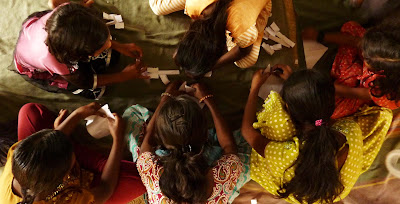According to the World Health Organization (WHO), three billion people – or half of the world’s population – cook their meals indoors over biomass-fueled open fires. Not only is the majority of this heat wasted, 20% of it is converted into toxic substances like carbon monoxide, benzene, and formaldehyde. In India alone, 500,000 people die annually as a result of indoor air pollution (IAP). Disproportionately, the majority of these victims are women and young children, as they spend the most time around indoor fires. These deaths are brought on by IAP-related diseases such as bronchitis, emphysema, and asthma. (Information from envirofitcookstoves.org).
In order to combat this health hazard, Shelter Associates has taken on the task of raising awareness about and making available smokeless chullahs (stoves) to families in slums throughout Sangli. These chullahs, acquired through ARTI (Appropriate Rural Technology Institute), are incredibly durable, practical, and greatly reduce toxic emissions and fuel use – directly benefiting the health of women and children. Costing approximately $15, Shelter Associates has developed a mechanism in which the people can pay for their chullahs in installments.
Abha Dhotre is an area in Sangli that first took the initiative of ordering smokeless chullahs in bulk. These chullahs were presented in the community on 16 July 2009. The meeting was attended by the self-help group on savings, Pratima Joshi (Executive Director of Shelter Associates), Lata Shrikhande (Associate Executive Director of Shelter Associates), Mr. Pravin More, Mr. Vivek Raman, Mr. Ravi (with WSP from the World Bank in Delhi), Sharda Kamble (president of the savings groups Shivan and Omkar), and Sunita Patil (the local corporator). In addition, the meeting was attended by more than fifteen women of Abha Dhotre and their children, along with Shelter Associates’ members from Pune and Sangli. The meeting was held at the Urdu Madarsa primary school that serves as a community center during the off-hours. While the women were happily receiving their new chullahs along with lemongrass bulbs gifted by Shelter Associates in homemade recycled paper bags, tea was prepared outside on one of the smokeless chullahs!

Smokeless Chullah being distributed in the community
During the distribution, Lata Shrikhande addressed the future success of these chullahs: “Shelter Associates had interacted with the women regarding vermicomposting before, which was a new idea to them at that time. I am confident that as they accepted vermicomposting as a new idea, similarly they will be able to make a transition and adapt to the smokeless chullahs in their own interest. Even the savings group we started and supported by economic activities has been successful due to people’s participation.”
Pravin More recalled his own childhood in a small village in Maharashtra where a smoke-filled kitchen was a common sight. He remembered his grandmother coughing away as she worked over her smoke-filled stove in the kitchen for the lack of a better alternative. Things just got worse in the rainy season as the wood would be damp. He appreciated Shelter Associates’ work as they are in tuned to the needs of the people. Mr. More has traveled all across the country meeting non-profits, local government bodies, CBOs, and NGOs. He has visited Shelter’s work in Sangli that was initiated nine years ago and is still in great working condition. He believes that when all stakeholders (i.e. the community, the NGO, and the local governance) work together to reach a common vision, there is no limit as to what can be achieved.

Community members were happy to receive their chullahs
Sharda Kamble expressed full faith in Shelter Associates’ social workers and their work with the community. Drawing classes, embroidery lessons, and savings groups have all brought the community members closer to one another. She recalled a public demonstration of the smokeless chullahs done by Shelter last month. One of her neighbors, Vidhya, has already bought a smokeless chullah and is happy to be cooking her family’s food on it. All the local cuisine such as bhakri can be cooked in this way. She mentioned that we tend to stick to our traditional ways regarding cooking, but technology and changing times can shift this tendency. She gave an example of Maghde, a middle-aged housewife, whose health has greatly suffered from the indoor air pollution of smoke-filled kitchens. She also reminded the women how often they get burned from operating a traditional chullah, suggesting that they be prepared for this change to smokeless chullahs. Sharda concluded by stating that whether she is around or not, the women can always count on Shelter Associates for giving good advice!
As the people will be moving into multi-storied buildings, the traditional way of cooking on the wood stove will no longer be feasible. Pratima Joshi articulated this concern, taking into consideration the wish of the women to continue to cook traditional cuisine in their new housing settings. Using smokeless chullahs makes this possible, while drastically improving the health of the women and their families. Clearly, the time for smokeless chullahs is now, as traditions must be thoughtfully adapted to accommodate modern changes.










